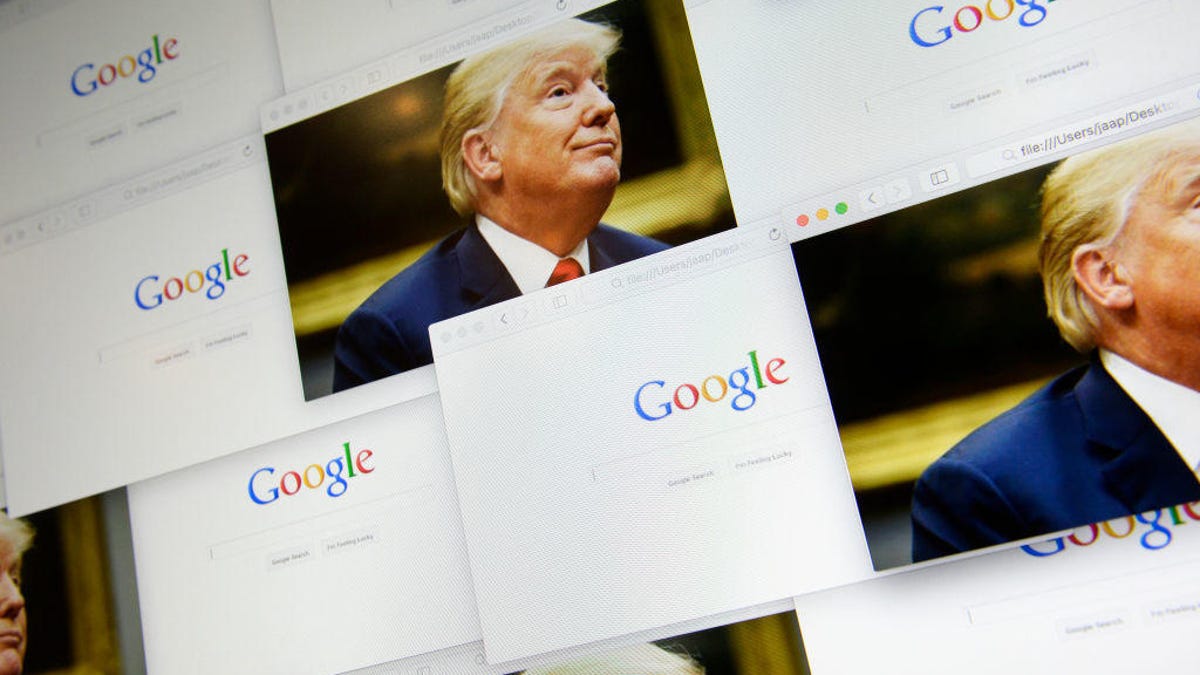Trump: Europe shouldn't 'sue' tech giants, but the US should
The US president also accuses Twitter of censoring him, and Google of trying to rig the next election.

Trump wants tech companies to be held accountable, but not by Europe.
In a Wednesday interview with Fox News, President Donald Trump criticized EU antitrust actions against big US tech companies, while saying he'd consider similar actions himself. On the receiving end of his ire was European Competition Commissioner Margrethe Vestager, whom he didn't name but referenced in terms of her work pursuing antitrust cases against tech giants and her upcoming bid to become the commission's next president.
"She hates the United States, perhaps more than any person I've ever met," Trump said. "She's suing all our companies. We should be suing Google and Facebook and all that, which perhaps we will."
The EU can issue fines to US tech companies such as Google because they operate in and provide services to customers across Europe. It's the commission's job to ensure that companies dealing with EU citizens are abiding by local competition law and giving customers fair choice to decide what services to use.
Vestager hasn't so much "sued" US tech companies, as handed down fines to them for breaking EU competition law. During her tenure in the commission she's issued landmark fines to Google, Amazon and Apple. Her investigations into Apple and Amazon were based on the lack of tax they paid within the EU, despite having local headquarters in European countries. In Google's case, the company was found to be in breach of competition laws with regard to its shopping, Android and advertising services, and was fined 8.2 billion euros.
A spokeswoman for Vestager declined to comment on Trump's remarks. Vestager previously said that she "very much likes the US," a comment she made while announcing the last Google antitrust ruling.
"This has nothing to do with what I feel, nothing whatsoever," Vestager said at the time. "The mission is very simple, we have to protect consumers and competition."
Not the first time Trump says @Vestager hates the United States. But she is not easily impressed.
— Pablo Pérez 🇪🇺 (@PabloPerezA) June 26, 2019
"I've done my own fact-checking (..) I very much like the US".
"The mission is very simple, we have to protect consumers and competition in the EU". pic.twitter.com/KzTKAMqknu
In the Wednesday interview, Trump also alleged, in a now familiar talking point, that tech firms are persecuting him and other conservatives. Trump said Twitter was censoring his message and preventing people from following him. "I've had so many people come to me [and say}: 'Sir, I can't join you on Twitter'," he said. Trump also alleged that Google is biased toward the Democrats. "Let me tell you, they're trying to rig the election," Trump said. "They should be sued."
Neither Google nor Twitter immediately responded to requests for comment on Trump's latest remarks. Those companies, and Facebook, have banned far-right leaders from their platforms, but they've also denied that it's because of a user's political views.
Last month, the White House launched a website that lets you share information with the government if you believe your social media account has been suspended, banned or reported because of political bias. Asked to comment at the time, a Twitter spokesperson said, "We enforce the Twitter Rules impartially for all users, regardless of their background or political affiliation. We are constantly working to improve our systems and will continue to be transparent in our efforts."
Last year, Google CEO Sundar Pichai told the House Judiciary Committee that Google operates without a political agenda. "I lead this company without political bias and work to ensure that our products continue to operate that way," Pichai said. "To do otherwise would go against our core principles and our business interests. We are a company that provides platforms for diverse perspectives and opinions -- and we have no shortage of them among our own employees."

